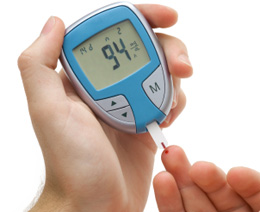How do you know when you’re hungry? Your stomach growls? It’s noon? Others are eating?
A new study from the University of Houston’s Department of Health and Human Performance examined “disinhibited overeaters”— those who can't stop themselves from overeating — and found using blood-glucose monitors was an effective tool in helping them rethink their hunger thoughts to eat only when hungry.
“They don’t really know what hunger is. They confuse it with negative emotions, external eating cues or social cues,” said Tracey Ledoux, UH assistant professor and researcher with the UH Texas Obesity Research Center (TORC). “It's thinking you’re hungry when you’re really just bored or sad. These negative cues may prompt them to sit down for a meal or a snack and feel compelled to overeat. It’s having feelings of ‘I know I shouldn't eat this, but.’”
Ledoux says many women and men who fit this category usually are chronic dieters, who lose and gain weight following structured diet plans, perhaps because the plans focus on improving restraint rather than on an internal strategy to eat only when hungry and stop when full.
For eight weeks, participants in the UH study were trained to confirm their hunger by using a blood-glucose monitoring device to measure their blood sugar. Readings between 60 - 85 mg/dl (milligrams per deciliter) indicated physical hunger or energy depletion. Further training instructed them how to recognize that true hunger feeling and how to satisfy their hunger with healthy meals or snacks.
“But if their blood-sugar was over the target range, yet they thought they were hungry, they were encouraged to stop and examine what else might be going on—are they tired, are they bored, are they experiencing some negative emotions,” Ledoux said. “At this point they implemented coping skills to deal with their food cravings and postponed their meal or snack.”
Study participants were either overweight or categorized as obese (not diabetic) and were selected based on their responses to questions on their dieting and eating habits. Each participant received individual counseling sessions.
By the end of the study, most participants had lost weight and were less likely to eat because of external reasons. Ledoux is quick to add that the blood-glucose monitors, while effective, are only tools and not meant to be used for the long term. She hopes to expand the study.
A new study from the University of Houston’s Department of Health and Human Performance examined “disinhibited overeaters”— those who can't stop themselves from overeating — and found using blood-glucose monitors was an effective tool in helping them rethink their hunger thoughts to eat only when hungry.

“They don’t really know what hunger is. They confuse it with negative emotions, external eating cues or social cues,” said Tracey Ledoux, UH assistant professor and researcher with the UH Texas Obesity Research Center (TORC). “It's thinking you’re hungry when you’re really just bored or sad. These negative cues may prompt them to sit down for a meal or a snack and feel compelled to overeat. It’s having feelings of ‘I know I shouldn't eat this, but.’”
Ledoux says many women and men who fit this category usually are chronic dieters, who lose and gain weight following structured diet plans, perhaps because the plans focus on improving restraint rather than on an internal strategy to eat only when hungry and stop when full.

For eight weeks, participants in the UH study were trained to confirm their hunger by using a blood-glucose monitoring device to measure their blood sugar. Readings between 60 - 85 mg/dl (milligrams per deciliter) indicated physical hunger or energy depletion. Further training instructed them how to recognize that true hunger feeling and how to satisfy their hunger with healthy meals or snacks.
“But if their blood-sugar was over the target range, yet they thought they were hungry, they were encouraged to stop and examine what else might be going on—are they tired, are they bored, are they experiencing some negative emotions,” Ledoux said. “At this point they implemented coping skills to deal with their food cravings and postponed their meal or snack.”
Study participants were either overweight or categorized as obese (not diabetic) and were selected based on their responses to questions on their dieting and eating habits. Each participant received individual counseling sessions.
By the end of the study, most participants had lost weight and were less likely to eat because of external reasons. Ledoux is quick to add that the blood-glucose monitors, while effective, are only tools and not meant to be used for the long term. She hopes to expand the study.